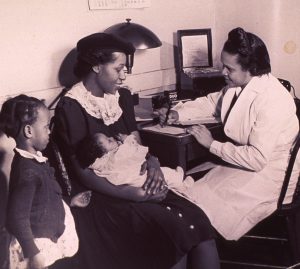Nov
07

Posted by Margot M on November 7th, 2018
Posted in: Communities of Interest
Tags: hospital librarians, nursing education, nursing research

Nurse taking a medical history, National Library of Medicine.
Kerry Dhakal’s recent article in the Journal of the Medical Library Association identifies librarians and nurses as natural partners in establishing evidence-based practice. Nurses participate in lifelong learning activities, and highly value the assistance that they receive from librarians.
To explore this topic, I asked New England hospital librarians about their work in supporting nursing education and research. For the next several months, I will share these interviews. Our first interview is with Mary Shah, MLS, AHIP. She is a Medical Librarian and Archivist at Danbury Hospital in Connecticut. She supports New Milford Hospital and provides back-up for the librarian and Norwalk Hospital.
I welcome everyone to the library. New hires receive a tour. If a staff member is going to school (from a patient care technician becoming a registered nurse to administrators earning their DNP), I give one-on-one training sessions on how to search the literature. I have attended manager’s meetings to demonstrate updates in resources. I attend unit meetings to show how to efficiently use our resources. I am a member of many nursing councils and provide research assistance with issues facing the nurses in the units. I instruct on formatting. I also help students in nearby nursing programs—word has gotten out that we provide accessible and reassuring service. If a nurse asks for help, I try to provide the information they never knew existed in the manner that they find most useful. I also strongly encourage people to continue with research and education, even after they’ve earned their degrees.
At the competency marathon, my 5-minute introduction to Evidence-Based Practice was a hit. I try to connect what they need at the bedside with what is in the literature in a way they can use. Both students and professors appreciate my lecture on “Searching the Literature: The Beginning”. With humor and clear examples, people who aren’t used to databases can connect with some help.
At Western Connecticut Health Network, we offer CINAHL and Lippincott Nursing Advisor as nursing-specific resources. I promote PubMed to our nurses for a comprehensive search as paired with CINAHL (a complete information feast). We also have the Cochrane Database for Meta-analyses and Reviews. To keep formatting and bibliography headaches to a minimum, we have web-based RefWorks. We urge our users to start using this at the beginning of their research projects and publications. We also have DynaMed (an evidence-based point-of-care tool), Micromedex (electronic drug reference), Natural Medicines (complementary and integrative medicine), and Visual Dx (a diagnosis point-of-care tool very popular in our Emergency department). MedNews Plus is popular for continuing education units.
We take a holistic approach: if this makes you a better healthcare provider, we will find a way to connect you to the information that you need in the way you can best use it. We are mindful of time constraints—nurses are very busy people, pulled in many different directions. We try to partner in a way that is respectful of the profession. At Western Connecticut Health Network, our mission is to improve the health and well-being of those who live in our communities.
When the research council was looking into practice models, I gathered information and broke it into manageable pieces for easier consumption. My fellow practice council members asked me to find best practice and evidence for everything from staffing ratios to preventing falls, from timing of food delivery to inpatients with diabetes to ethics consultation templates. Though the finance department may not consider the library clinical in the traditional sense, we partner with the clinicians to make sure that our patients are as safe and healthy as possible.
Listen. Be creative. Make connections. Be tenacious. Keep a sense of humility and humor at all times. Respect your patron as a professional. Collect, preserve, organize, and disseminate in ways that your patrons find useful.
Contact for Mary Shah: Mary.Shah@wchn.org
Librarians collaborating to teach evidence-based practice: exploring partnerships with professional organizations. J Med Libr Assoc. 2018;106(3):311-319. https://www.ncbi.nlm.nih.gov/pmc/articles/PMC6013130/